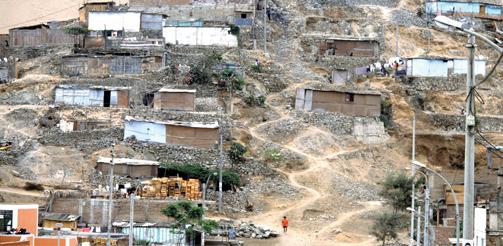Last October, I was a pleased to be a member of the IDS team attending Habitat III, the United Nations Conference on Housing and Sustainable Urban Development. The Conference poster hangs in my study. The strapline reads: ‘We decide the future of cities together’. This grandiose statement hides the more prosaic outcome of the conference – the New Urban Agenda, a sprawling ‘Christmas tree’ of a document, on which many stakeholders hung their concerns. But in addition to the New Urban Agenda manifesto, a key outcome of the conference was the decision to review the functioning of UN-Habitat, through the appointment of a High Level Panel.

An underperforming institution
UN-Habitat emerged with the first Habitat conference in Vancouver in the more idealistic 1970s. The headquarters were located in Nairobi – in line with desire of the South to be better represented globally. From the outset, UN-Habitat was open to NGOs, academics and other stakeholders, not just national governments. UN-Habatat’s World Urban Forum, held every two years, is deliberately not just a closed session of government representatives, but a vibrant and untidy marketplace of ideas with many levels of involvement and networking opportunities.
However, such decisions in favour of inclusiveness have had their costs. The ‘big league’ of UN institutions is still centred on New York and Geneva. A recent survey of UN institutions finds UN-Habitat languishing near the bottom when indicators such as staff morale are reported.
Furthermore, the organisation has had trouble retaining support and significant funding from the OECD countries – for example, the UK withdrew core financial support in 2011 after a review of multilateral organisations put UN-Habitat in its lowest category for aid impact.
UN-Habitat’s Executive Director Joan Clos, a former mayor of Barcelona, has made efforts to ensure that UN-Habitat has a ‘whole world’ agenda, not only one which is relevant to the global South. Identification of the need for affordable housing as the theme for World Habitat Day 2017 earlier this month is an example of this. (See Jaideep Gupte’s recent blog on this theme.)
Implementation of the New Urban Agenda has not attracted high profile in the year since the Habitat III Conference, perhaps in part because stakeholders have been waiting for the report of the High Level Panel as an indication of future direction. That report is now publicly available. It makes sober reading because of the gap between huge urban challenges and the perception (not just from governments – see Annex 5) of the underperformance of UN-Habitat.
Towards a more effective approach to urban work in the UN
Peter Calthorpe, a member of the High Level Panel has given his take on the challenge. He outlines three approaches needed: (1) to strengthen UN-Habitat (2) to coordinate urban work throughout the UN system and (3) to enhance the emphasis on standard-setting, best practice approaches or ‘normative’ work by UN-Habitat, rather than the current approaches with many local projects. Projects need to feed into and reflect the normative work in order to stay focussed on priorities and to ensure that the vision is grounded in tried and tested reality.
One of the key recommendations of the High Level Panel’s report is to establish UN-Urban, analogous to UN-Energy and UN-Water, to coordinate all UN urban activities. At the High Level Meeting in New York in September this approach did not attract support from the governments of UN member states. Citiscope analyst Gregory Scruggs summarizes: ‘national governments were nearly unanimous: No thanks’, citing concerns about additional layers of UN coordination and funding requirements and arguing that the case for benefits of this proposed innovation was not persuasive.
Coordination, coherence and distilling New Urban Agenda hold key for Global Goals
For those of us working on urban issues, we can only hope that UN-Habitat emerges from the process as a stronger and more effective organisation and that the UN system takes seriously the need for a coherent urban policy which coordinates the responses of its agencies. Both aspects are essential for the UN’s development work and delivery of the Sustainable Development Goals (SDGs). As the High Level Panel argue: since ‘UN-Habitat has a focal role in addressing urbanization’, the first challenge ‘must be to save, stabilize and then rapidly strengthen UN-Habitat to equip it for a renewed role based on the 2030 Agenda and the New Urban Agenda’. (para. 42)
It is instructive to recall that the Millennium Development Goals crystalized the conclusions of world conferences held during the 1990s. They only became widely known after they were boiled down to eight specific targets and given high level publicity. For UN-Habitat and other agencies to do the same with the New Urban Agenda would be a big step forward. This would show in popular form its direct relevance to the SDGs, and, back in the other direction, to show how the SDGs can only be implemented through the achievement of sustainable urbanization. To demonstrate this convincingly might also help with the hard discussions on the governance structure and financing of UN-Habitat. For participatory organisations, as well as skyscrapers, ‘form follows function’.
Roger Williamson is an IDS Visiting Fellow. He, with IDS colleagues attended Habitat III in Quito. He also participated in the meetings of the World Urban Forum in Vancouver 2006, Nanjing 2008 and Rio 2010. He was also key organiser for the UK government’s Wilton Park conference ‘Financing Affordable Housing’ (WP974), co-sponsored by UN-Habitat.
Image: UN ISDR on Flickr